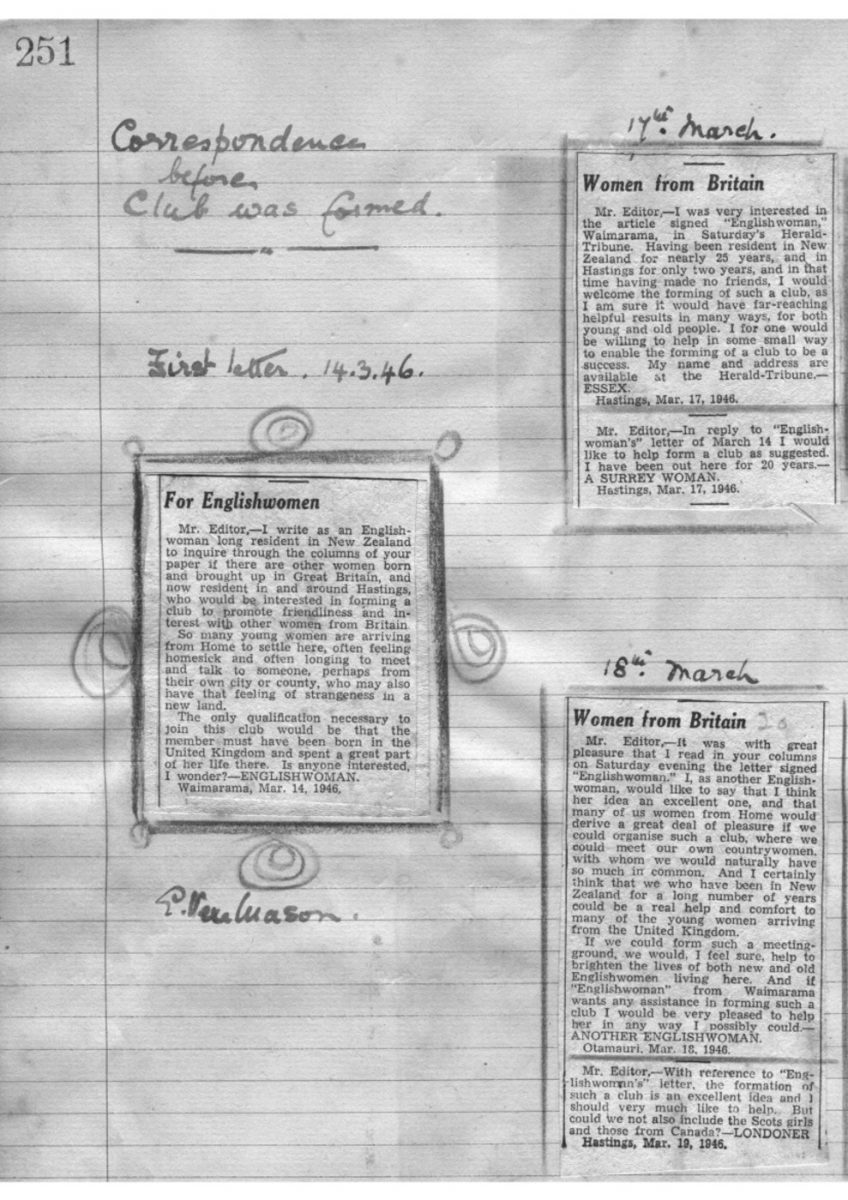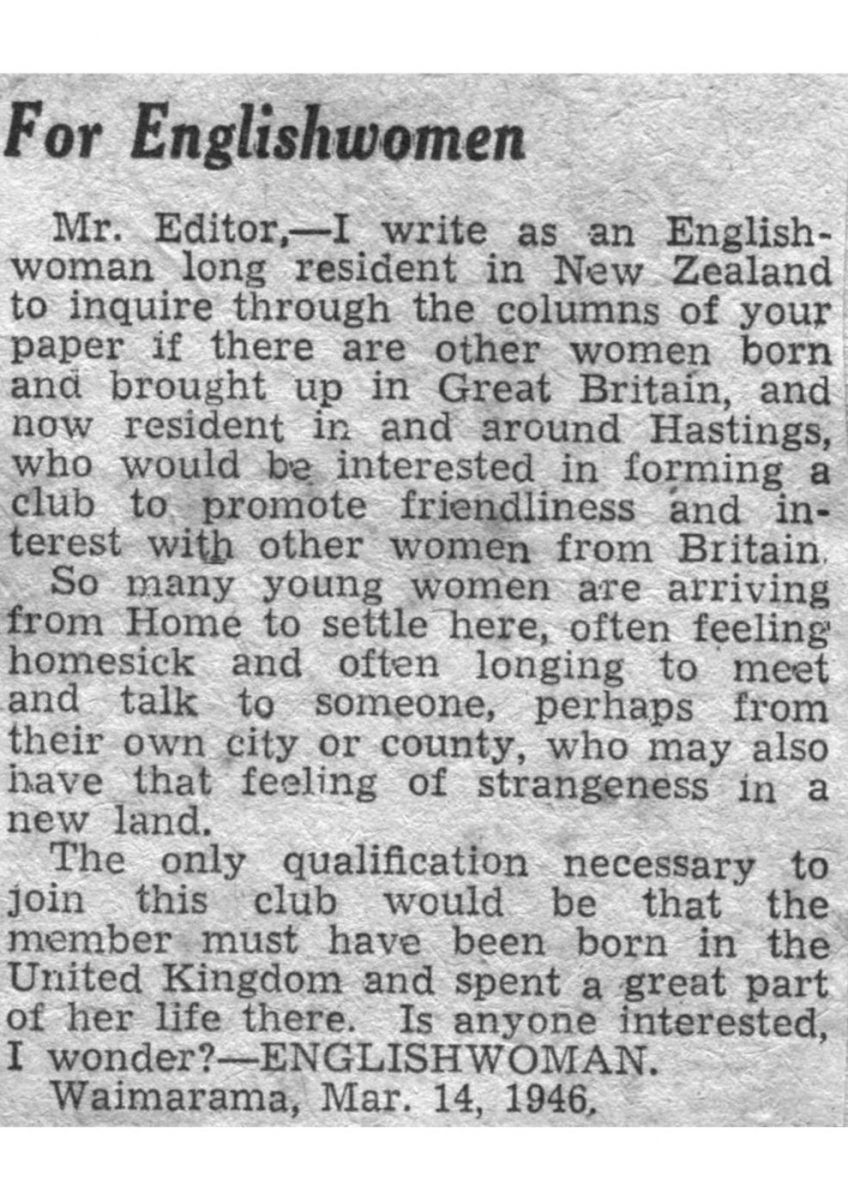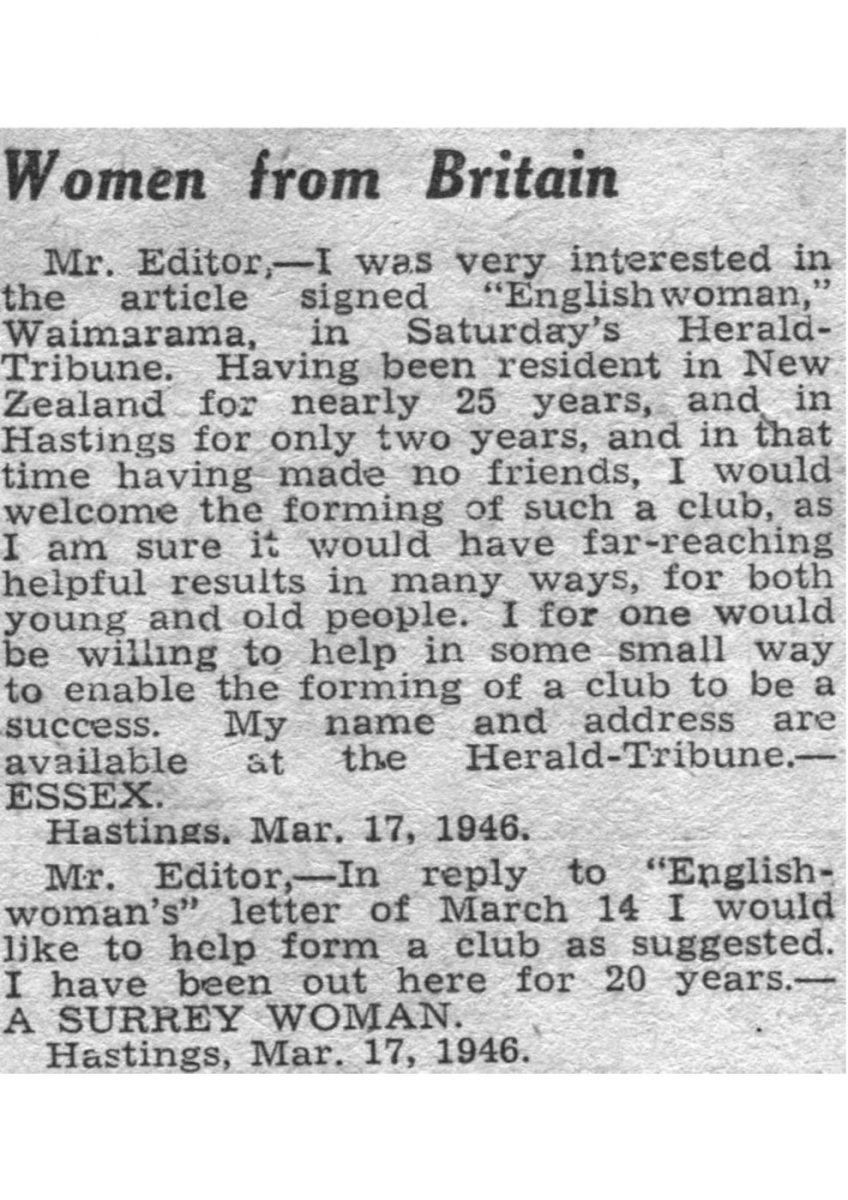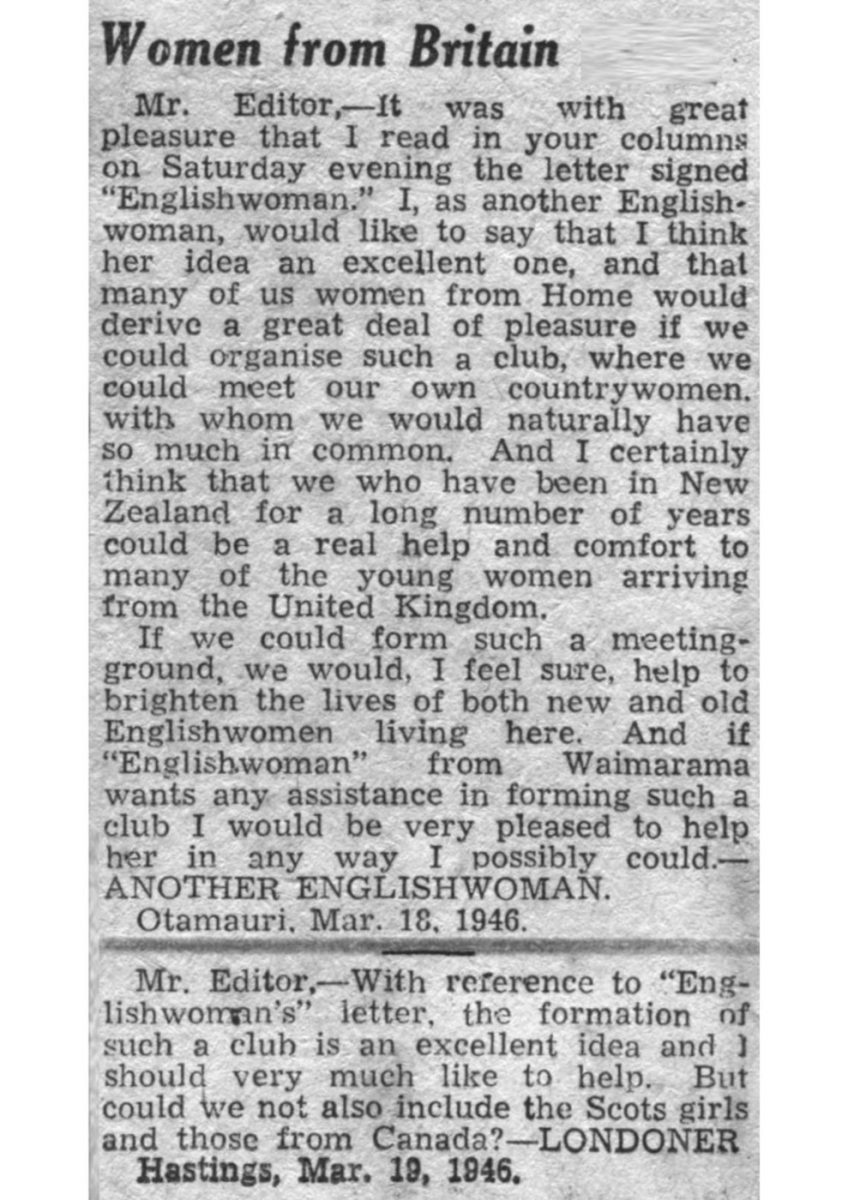- Home
- Collections
- CARDING B
- British Women's Overseas Club
- Letters to the Editor 1946
Letters to the Editor 1946
[Correspondence before Club was formed
First letter 14 March 1946, written by Vera Mason]
For Englishwomen
Mr Editor, – I write as an Englishwoman long resident in New Zealand to inquire through the columns of your paper if there are other women born and brought up in Great Britain, and now resident in and around Hastings, who would be interested in forming a club to promote friendliness and interest with other women from Britain.
So many young women are arriving from Home to settle here, often feeling homesick and often longing to meet and talk to someone, perhaps from their own city or county, who may also have that feeling of strangeness in a new land.
The only qualification necessary to join this club would be that the member must have been born in the United Kingdom and spent a great part of her life there. Is anyone interested, I wonder? – ENGLISHWOMAN.
Waimarama, Mar 14, 1946.

[17 March 1946]
Women from Britain
Mr. Editor, – I was very interested in the article signed “Englishwoman,” Waimarama in Saturday’s Herald-Tribune. Having been resident in New Zealand for nearly 25 years, and in Hastings for only two years, and in that time having made no friends, I would welcome the forming of such a club as I am sure it would have far-reaching helpful results in many ways, for both young and old people. I for one would be willing to help in some small way to enable the forming of a club to be a success. My name and address are available at the Herald-Tribune. – ESSEX.
Hastings, Mar. 17, 1946.
Mr Editor – In reply to “Englishwoman’s” letter of March 14 I would like to help form a club as suggested. I have been out here for 20 years – A SURREY WOMAN.
Hastings Mar 17, 1946.

[18 March 1946]
Women from Britain
Mr Editor – It was with great pleasure that I read in your columns on Saturday evening the letter signed “Englishwoman”. I, as another Englishwoman, would like to say that I think her idea an excellent one, and that many of us women from Home would derive a great deal of pleasure if we could organise such a club, where we could meet our own countrywomen, with whom we would naturally have so much in common. And I certainly think that we who have been in New Zealand for a long number of years could be a real help and comfort to many of the young women arriving from the United Kingdom.
If we could form such a meeting-ground, we would, I feel sure, help to brighten the lives of both new and old Englishwomen living here. And if “Englishwoman” from Waimarama wants any assistance in forming such a club I would be very pleased to help her in any way I possibly could. – ANOTHER ENGLISHWOMAN.
Otamauri, Mar. 18, 1946
Mr Editor – With reference to “Englishwoman’s” letter, the formation of such a club is an excellent idea and I should very much like to help. But could we not also include the Scots girls and those from Canada? – LONDONER
Hastings, Mar 19, 1946

[19 March 1946]
Women from Britain
Mr. Editor, – I too would like to extend a friendly hand to our young kinswomen coming to a strange land. I think a club as suggested would help them to settle happily in this pleasant land, knowing that when lonely days come they could talk about the Old Land to folk who know what that “lonely feeling” means. – “SCOT AND WELSH HYBRID.”
Hastings, Mar. 19, 1946.

[21 March 1946, written by Vera Mason]
Mr. Editor, – I am very glad that the idea of forming a club for women of Great Britain has met with such enthusiasm. As soon as arrangements for a meeting in Hastings can be made, an advertisement will be put in this paper. It is hoped that all those women who have written supporting the idea, and who have shown such keen interest, will attend the meeting. – ENGLISHWOMAN.
Havelock N., Mar. 21, 1946.

[21 March 1946]
Women from Britain
Mr. Editor, – Quite a number of women in Hastings seem very anxious to form a club for British women exclusively. This, I consider, is a reflection on the New Zealand women, and at the same time reveals a fault in British women – that of preferring their own clique. I have one or two good friends among Englishwomen, but the majority are inclined to be too reserved and cautious in words and actions.
One writer to the Herald-Tribune stated that she had been in New Zealand for 25 years, and in that time had made no friends. Well, whose fault is that? Her own, I should say. She will find that, unless she takes a friendly spirit into this club, it is not going to help her or anyone else very much. Far better to form an international club and allow women from other countries to join. Now is the time the world should be showing a peaceable, friendly spirit.
If these Englishwomen have been thankful enough to come to our country and enjoy its privileges and benefits, then surely the New Zealand women should be good enough to associate with?
However, my opinion is not likely to hinder the formation of this proposed club. But if the co-operative spirit is absent, it will be impossible for friendliness to exist. Needless to say I am a New Zealand-born woman and proud of it. – “TUI”
Hastings, Mar. 21, 1946.

Mr. Editor, – “Englishwoman’s” letter in last Saturday’s paper makes me write to say how delighted I would be to join such a club if it were formed in Hastings by women from the United Kingdom.
I was born and bred in Northern Ireland. I am often in town, and with nowhere to spend a leisure hour, how delightful it would be, to me, to drop in to “our” club and spend the time in pleasant company among my own kith and kin. I am immensely interested. My address will be at the Herald-Tribune Office – “MOLLY-O.”
Ongaonga, Mar. 19, 1946.
Mr. Editor, – I, another Englishwoman, think the suggestion of “Englishwoman” a very good one. If any of us can be of help to the war brides, and help them to love their adopted country and its people as much as I do, then it will be worth while – “MAHANA 1919.”
Waipawa, Mar. 21, 1946.

[25 March 1946]
Women for Britain
Mr. Editor, – Your correspondent “Tui” seems very perturbed about the proposed formation of a club for British women resident in the Hastings district. Might I suggest that “Tui” fails to realise that the object of the club is for people of Britain to meet and converse about places they know, and which perhaps “Tui” has never heard of, let alone converse about.
What is “Tui’s” object in proposing an international club, where presumably the so-called reserved and cautious-of-word Englishwomen would be tolerated as members? If “Tui” calls her letter of a peaceable and friendly spirit, which she so much advocates, all I can say is, let it be a British club – A SOMERSET WOMAN.
Mr. Editor, – The letter from “Tui” made me sigh for her lack of “understanding”. Because the women from Britain welcome the opportunity of meeting each other, it does not mean they will be turning their backs on their New Zealand friends. Perhaps “Tui” has never been away from her own country so she does not realise what it means to be thousands of miles from all familiar scenes and faces.
I have been told by New Zealanders who have visited England, that when they have encountered others from their own land, even though they had previously only known them by sight, they have greeted each other as old friends. Then what about New Zealand House in London? Does “Tui” regard this as an unnecessary and unfriendly institution?
It is more than possible that it is her own attitude of mind which causes “Tui’s” English acquaintances to be “reserved and cautious in words and actions.” Let her be more co-operative herself before she criticises others. – ONE OF THE ENGLISHWOMEN.

[26 March 1946]
READERS’ OPINIONS
Women from Britain
Mr Editor, – I also think it a happy idea of “Englishwoman” to form a club.
In reply to “Tui”, whose letter was curiously bitter, I am sure that most other English-born women in New Zealand will agree with me that this is a fine country to live in, and we are grateful for the friendship and hospitality it has extended to us. New Zealanders have a sense of good-neighbourliness that it would be hard to equal in any other country. Our roots, however, are in England, or in whatever part of Britain was our home. Friends of home and school are there. We have known and loved the bleak fell, the Surrey hills and the seagulls over the Cornish cliffs. We cannot and would not lose our memories. Why should “Tui” begrudge us a chance to get together?
Of course she is proud of being a New Zealander. So she should be. We hope our children will be. Are we not allowed to be proud of being English-born too? My address is at the Herald-Tribune office. – WIRRAL.”
Havelock N., March 26, 1946
Mr Editor – I too would like to join with all the other people who have mentioned through your columns the formation of a club in Hastings to help the brides coming out from Home to settle down in this land. I think it is a lovely idea.
Just a few words to “Tui”. She has got the wrong impression altogether. We are not slighting the New Zealanders in any way whatsoever. How would a New Zealander and an Englishwoman or a Scot for that matter, get on in a room together talking about Home and all the places with which the Englishwoman was familiar if the New Zealander had never been out of this country? That is what we mean by this club. The girls coming from Home can talk with women who, like myself, were born at Home and lived at Home for a good many years before coming out to New Zealand. – ABERDONIAN AND PROUD OF IT.
Hastings, March 26, 1946.
Mr. Editor, – Having travelled the world, I am of the opinion that our New Zealand women are equal to, if not better than, those of any other country. There are exceptions, such as “Tui”. Let us not forget the sacrifices made by the women of England and other parts of the Empire to make us welcome and to make us feel at home with all they could do. A letter or news from home was like a tonic.
I am sure that our New Zealand women will do all they can to help these overseas brides to settle in a new home, but, after all, there is nothing like a little news of those left behind. So let us get busy and arrange meetings and a meeting-place. A good many more women are on their way. Let us arrange to welcome them. Do not let it happen again as it did last Thursday, that there should be no-one to greet the soldiers’ wives. I enclose a £2 donation to expenses. – EX-N.Z.E.F.
Napier, March 26, 1946.

[26 March 1946]
Women from Britain
Mr. Editor, – If a mere man may butt into a woman’s argument, I think “N.M.E.” dealt too lightly with friend “Tui”. If that “dear” lady is an example of the tolerance and understanding of New Zealand’s womanhood, I thank my lucky stars I am engaged to an English girl. No wonder Englishwomen need a haven of their own if they are to be patronised in such a manner.
I wonder if “Tui” stops to think that probably the Englishwoman who has been here 25 years has done more than she to help gain those benefits, etc., she babbles over. To one who has experienced English hospitality and friendship, her mention of faults and cliques is disgusting.
Oh yes, I am New Zealand-born too, but, if her’s are examples of New Zealanders’ opinions, not so proud. Does she know that the most completely exclusive Serviceman and woman’s club in London is the “Fernleaf” in which a Serviceman may not entertain any friends other than New Zealand personnel? What price cliques?
But what’s the use, so, Englishwomen, on to the good work. If you can make one English girl in particular feel at home when she gets here, here’s a New Zealander who’s very grateful. – HOMEY’S HUBBY.
Hastings, March 26, 1946.

[26 March 1946]
Women from Britain
Mr. Editor, – I should like to reply to “Tui’s” letter in Saturday’s Herald-Tribune.
I do not think it is very fair of “Tui” to say these women from our Homeland consider we are not good enough to associate with. Just stop and think for a while. Let us put ourselves in their position, far from home and friends. How nice it would be to be able to meet someone who spoke our own language and perhaps, in the later arrivals, meet someone who we knew came from near our parents and could give news of dear ones. Would we not welcome such a club?
I have among my nearest and dearest friends one dear soul who comes from Scotland. I can safely say of all the Home folk I have met at her place that they are very grateful for the privilege of living here and do not consider themselves any grander than we are. In my case, they have been much nicer than some of our own New Zealand women. So I wish “English-woman” luck in her project and lots of members. – A NEW ZEALANDER.”
Pakipaki, March 25, 1946.

[26th and 27 March 1946]
Women from Britain
Mr. Editor, – May I say that I think the formation of a club for Englishwomen is an excellent idea – and I am a New Zealander.
I wish this club every success, and I hope it brings pleasure to many women who are far from their homeland. Everyone who lives in New Zealand and earns a living here is a citizen of this country and owes it, in return, loyalty and affection. But however fond one grows of one’s adopted country, it is not the land of one’s birth.
I hope this club will help many a newcomer to New Zealand over her homesickness and help her to settle down happily. Good luck to your club, “Englishwoman”. NEW ZEALANDER
Hastings, March 26, 1946.
Mr. Editor, – I would like to thank “Tui” for her courage. I heartedly endorse her remarks, as expressed in her letter of March 21. I am also proud to be a New Zealand-born woman. – “KIWI”.
Hastings, March 27, 1946.
Mr. Editor, – Might I ask some of the British women who seem to be so eager for a British Women’s club what class of women will be welcome? Is it to be for all classes, where Mrs O’Grady and the Colonel’s Lady will meet as equals? Or will it degenerate, as most of these women’s organisations do, into a class affair? Will the members who belong to the professional and wealthy farmers’ class really mix with allcomers, even if they should be charwomen? Or will they sit in a seat by themselves and smile with a sweet patronage at the common herd?
For myself, I think there is no need for such a club. There are plenty of guilds and clubs, both secular and religious, to meet every woman’s needs. If only the members would once and for all be really sociable and forget class distinctions.
I have lived 33 years in New Zealand and 33 in England. Since I have been here, I have made quite a number of friends, mostly New Zealand-born women. The young women who come here as Servicemen’s wives must be prepared to say with Ruth: “Thy people shall be my people.” They would soon find plenty of friends without the aid of a British women’s club.
I would, however, like to ask “Tui” if she would like to be a member of an international club. If so she is the first New Zealand woman I have met who wanted to be on terms of equality with Chinese or Maoris as well as Europeans. An international club would be composed of all races and no colour bar. – “SATISFIED COCKNEY.’
Havelock N., March 26, 1946.
Mr. Editor, – May I be permitted to answer the letter in Saturday’s Herald-Tribune signed “Tui”? Would “Tui” carefully re-read my letter in the issue of Monday 16? I did not state that I had made no friends in the 25 years I had lived in New Zealand, and am not the unfriendly person she evidently believes me to be. Far from it, as I have many friends, both English and New Zealand in the town where I formerly resided for 23 years.
Her opinion will certainly not hinder the formation of the “Women from Britain” club. The letter headed “Arrival” also in the issue of March 23 and signed “Digger” stresses the need for such a club. Can “Tui” imagine what a cheery word and a little kindly help would have meant to those newly-arrived English wives?
Evidently “Tui” has not travelled far; otherwise her mind would have been more enlightened. – “ESSEX.”
Hastings, March 26, 1946.

Non-commercial use

This work is licensed under a Attribution-NonCommercial 3.0 New Zealand (CC BY-NC 3.0 NZ).
Commercial Use
Copyright on this material is owned by Hawke's Bay Today and is not available for commercial use without their consent.Can you help?
The Hawke's Bay Knowledge Bank relies on donations to make this material available. Please consider making a donation towards preserving our local history.
Visit our donations page for more information.
Subjects
Format of the original
Newspaper lettersDate published
March 1946Publisher
The Hawke's Bay Herald-TribuneAcknowledgements
Published with permission of Hawke's Bay Today
People
- Mrs Vera Mason











Do you know something about this record?
Please note we cannot verify the accuracy of any information posted by the community.